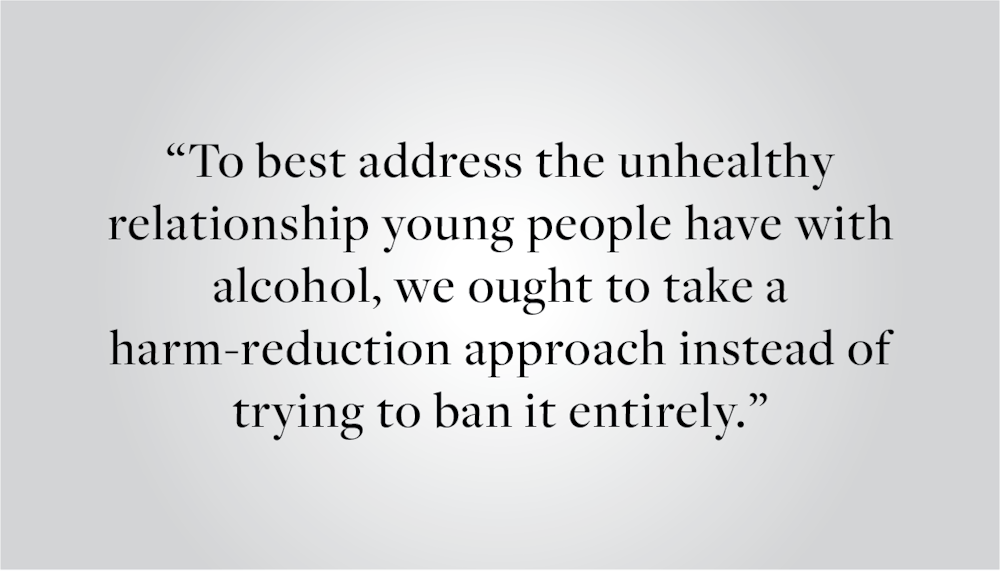It’s Friday night and I’m at Josiah’s with friends after a night out. As I walk to the bathroom, I see an all-too-familiar sight: There’s a kid passed out with his worried friends attending to him. While initially reluctant, the kid’s friends eventually decide to call for help and 10 minutes later, EMS vehicles arrive. This anecdote encapsulates the everyday reality of being a college student in America. It’s time we acknowledge that our national drinking culture is not normal and demand that universities and the government do more to protect students and promote healthy drinking habits. This starts by lowering the legal drinking age.
America has always had a complicated relationship with alcohol. From the pilgrims to the Mothers Against Drunk Driving hysteria of the ’80s, there has always been a push-and-pull between our simultaneous thirst for alcohol and our desire to keep it at an arm's length. But as the failures of Prohibition, the war on drugs and the national minimum drinking age have shown, taking a punitive approach against drinking rarely works. Despite underage possession of alcohol being illegal in all 50 states, a 2018 study found that 37% of college students engaged in binge drinking within a month of being surveyed and 11% met the criteria for Alcohol Use Disorder. Instead of enjoying alcohol in moderation, many students binge drink in what is now a ritualized and central part of the American college experience. To best address the unhealthy relationship young people have with alcohol, we ought to take a harm-reduction approach instead of trying to ban it entirely.
Most countries around the world set their minimum drinking age between 18 and 20 years old. Although 18 is the age of majority in the U.S., coming with all the responsibilities of adulthood, young adults are still unable to purchase alcohol until they turn 21. The irrationality is striking. Our current drinking age results in a situation in which students pretend to be of age when they drink, and university administrators look the other way. For most young people, this means that their first independent experiences with alcohol will be in an unsupervised environment ripe for disaster. While bars and clubs won’t serve customers that are already intoxicated, the rampant pregaming culture among underage college students noticeably lacks this security.
Making alcohol taboo has unintentionally created an aura of mystique around a drunken night out for teenagers. Given the prevalence of underage drinking, the current drinking age criminalizes the vast majority of young people and has spawned an industry for fake IDs. What kind of message does that send to young adults as they move into the real world? That laws are meant to be broken. And are we really safer if students feel that, because of illegal drinking, they are unable to get help in emergency situations for fear of self-incrimination?
Many adults will continue to partake in recreational drinking long after leaving school. It is therefore imperative that students develop responsible and informed drinking habits while still in college. The frat basement is not the place for that preparation. As the first stop towards independence for many young people, universities have a unique responsibility to play a more active role in guiding students toward healthier habits. The EverFi training Brown provides to all first-years might let the University claim it is doing something. However, in practicality, the program is unengaging and provides only short-term benefits to students preparing for the realities of college drinking. Lowering the drinking age would allow universities like Brown to more meaningfully engage with students throughout their time in college by openly acknowledging the presence of alcohol on college campuses and better regulating how and when it is served.
As a society, we need to have a more nuanced conversation about alcohol use and abuse. But that conversation can only begin when we finally treat young adults as rational agents capable of making good decisions.
Tas Rahman ’26 can be reached at tasawwar_rahman@brown.edu. Please send responses to this opinion to letters@browndailyherald.com and other op-eds to opinions@browndailyherald.com.

Tas Rahman is an Opinion Editor and a member of the Editorial Page Board. He hails from Detroit, Michigan and is concentrating in Computational Biology and Judaic Studies. In his free time, you can find Tas hiking and reading the Atlantic (alongside the Herald).





